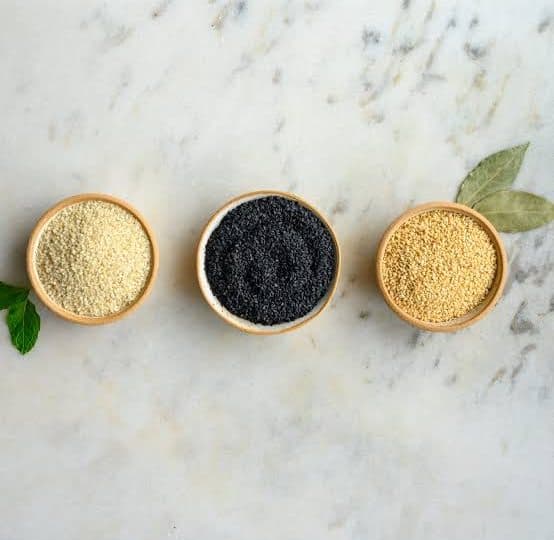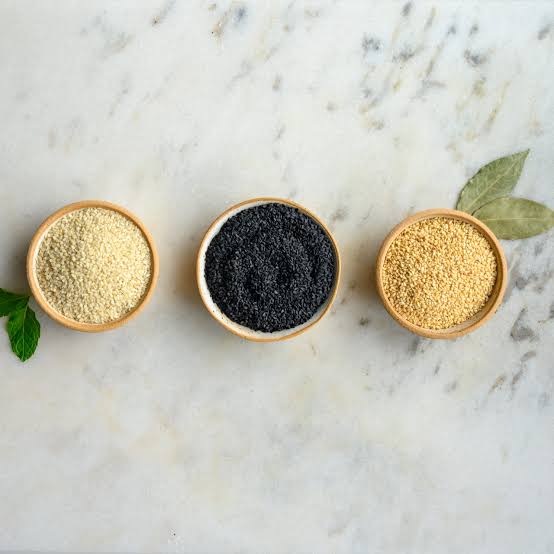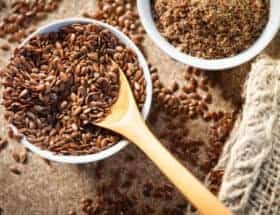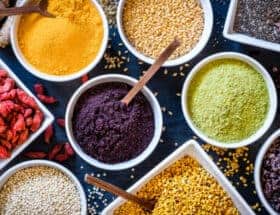Sesame seeds are fatty seeds cultivated from pod of the Flowers grown on annual herb plants. Sesame plants are mainly grown in tropical regions and are also referred as ‘survivor crops’, as, these require very little soil fertility to nurture. These healthy, tiny looking seeds are tight packed with essential vitamins and minerals necessary for the growth and development of body. This is the very reason sesame seeds fall under the category of superfood items, despite so many sesame seeds side effects.
Why sesame seeds are important to include in diet plate?
Although sesame seeds side effects are considerable, but, if you follow the recommended dosage, the benefits of these overcome the sesame seeds side effects. There is a long train of benefits of eating sesame seeds. Having these seeds regularly is an amazing way to polish your health in almost every aspect. Mentioned below is a brief list of all the good things sesame seeds do to your body, which overtake sesame seeds side effects:
- Fibre in sesame seeds keep digestion and gut bacteria healthy.
- Sesame seeds build good cholesterol and reduces the count of the bad ones at the same time.
- These are fantastic source of plant protein which helps to reduce compounds that hamper protein absorption.
- Magnesium in sesame seeds lower the blood pressure to great extent.
- The presence of essential vitamins and minerals avoids plaque build-up in arteries, enabling free blood flow.
- Rich amount of calcium strengthen bones and heals arthritis and joint pains.
- The anti-inflammatory properties in sesame seeds prevents chronic conditions like obesity, kidney and heart diseases, cancer, etc.
- Sesame seeds are storehouse of B vitamins, which are responsible for proper cellular functions and metabolism.
- Low carbs, high protein and good amount of healthy fat in these seeds turn out to be diabetic friendly.
- The antioxidant trait helps fight free radicals to reduce oxidative stress and protect the cells from damage.
- Acts as a major immune boosting food, as, sesame seeds are loaded with immune nutrients which recharge the immunity.
These have tremendous source of selenium, zinc, iron, copper etc., which support thyroid hormones and thyroid health.
What quantity of sesame seeds should you eat?
- Normally, one should consume 1 tbsp of sesame seeds along with breakfast during winter season and dosage is reduced to half in summers to avoid sesame seeds side effects.
- For people with different health issues, the daily dosage of sesame seeds is mentioned in the table below:
| Health Problems
|
Daily Dosage |
| Unhealthy Digestion | 3 tbsp |
| Heart Disease | 5 tbsp |
| Protein Deficiency | 3 tbsp |
| High Blood Pressure | ½ tbsp |
| Weak Bones | 3 tbsp |
| Obesity | ½ tbsp |
| Deficiency of B Vitamins | 3 tbsp |
| High Blood Sugar | 5 tbsp |
| Weak Immunity | 3 tbsp |
| Arthritis | 5 tbsp |
| Hormonal Imbalance | 3 tbsp |
| Thyroid Problems | 3 tbsp |
*to avoid sesame seeds side effects the dosage is reduced to half in summers.
Are there any sesame seeds side effects?
Too much of good thing leaves behind bad marks and so are the sesame seeds side effects. Yes! You will be shocked to know that sesame seeds side effects are hazardous when these are consumed beyond prescribed dosage. This superfood work miracles when eaten on a daily basis, but one has to keep a check on the quantity of consumption, as, there exits a long list of sesame seeds side effects. Below are some common yet major sesame seeds side effects for you to read, acknowledge and consider.
1. Allergic reactions: Consuming sesame seeds or applying the seed oil can cause little to extreme allergic reactions such as, irritated skin, lining in the stomach etc., in some people. This is one of the most common sesame seeds side effects.
2. Nasal blockage: Sesame seeds side effects often includes short-term nasal dripping and blockage, when such seed oil is used as nasal spray to treat dry and crusting nasal tissues.
3. Anaphylaxis: One of the prominent sesame seeds side effects is Anaphylaxis, an immune reaction caused by the release of powerful chemicals.
4. Impact on Surgery: Sesame seeds trigger the blood sugar level, therefore, these should not be consumed pre and post surgery. Sesame seeds side effects includes alterations in sugar level, leading to chronic conditions in case of surgery.
5. Appendix Infection: Sesame seeds side effects includes appendix infection, which is a common type of infection. Consuming large amount of sesame seeds causes inflation in the intestines, resulting in such infection.
6. Colon Cancer: Eating excess amount of sesame seeds leaves behind harmful impacts, as, it causes inflammation in the colon, which leads to colon cancer. Hence, to avoid such sesame seeds side effects, these must be eaten in moderation.
7. Unhealthy Weight Gain: Sesame seeds are fatty and oil rich seeds, hence, unnecessary weight gain is common among sesame seeds side effects, if the quantity of intake is not taken care of.
8. Gastric Obstruction: The rich amount of fibre present in sesame seeds leads to slow movement of food, which causes risk of bowel obstruction and constipation in some people. Gastric obstruction is very common among the sesame seeds side effects.
9. Diverticulitis: Sesame seeds side effects should not be taken lightly, as, excess of these seeds can create a thin layer on the inner walls of the large intestine, which causes cramps, abdominal pain and so much more. Try avoiding such serious sesame seeds side effects, as these can lead to surgeries and treatments.
10. Hair loss: This is the most unheard among sesame seeds side effects. Most of you might have experienced adverse results of applying such seed oil. The reason to this is that, excess of sesame seed oil causes hormonal imbalance leading to oily scalp and dry hair follicles. Such imbalance leaves a negative impact on the hair, which can even cause complete baldness.
Who should avoid eating sesame seeds?
- People suffering from low blood pressure should avoid such consumption, as sesame seeds itself reduces blood pressure which would lead to some serious sesame seeds side effects.
- People with low blood sugar level should not include such seeds in their diet, as, sesame seed alters blood sugar count.
- Children less than 2 years of age shouldn’t be given sesame seeds, as, these contain powerful nutrients which can lead to chronic sesame seeds side effects in children below 2.
- Pregnant and breastfeeding women should consult the doctor before eating sesame seeds to avoid sesame seeds side effects.
- People on certain medications should consult the doctor to avoid negative interaction of medicines with such seeds.
- People undergoing or planning to undergo any surgery should avoid such seeds to keep sesame seeds side effects at bay.
How to avoid sesame seeds side effects?
- The best way to avoid sesame seeds side effects is to straight away avoid the consumption of sesame seeds. Read the instruction on the food items to see if there are any sesame seeds present. Keep a watch on the outside food you eat, especially baked items, crackers, cereal bars, bread etc.
- Take special care when you travel. It’s always better to pre plan your meal if you are away from home. Try to carry some sesame free snacks and foodstuff along with you while travelling.
- Always be ready for emergencies. In case you accidentally consume sesame food. Be ready with the prescribed medicines.
- Be cautious while choosing your regular cooking oil, as, most of the healthy oil includes some portion of sesame seed oil. Sesame seed oil is wonderful for health, but people who are sensitive to sesame seeds side effects should be careful while purchasing their cooking oil.
Sesame seeds are popular among super powerful food items, so, a proper learning is necessary before having them. Hence, this article provides an easy understanding about the consumption and sesame seeds side effects to create awareness and better health.
































